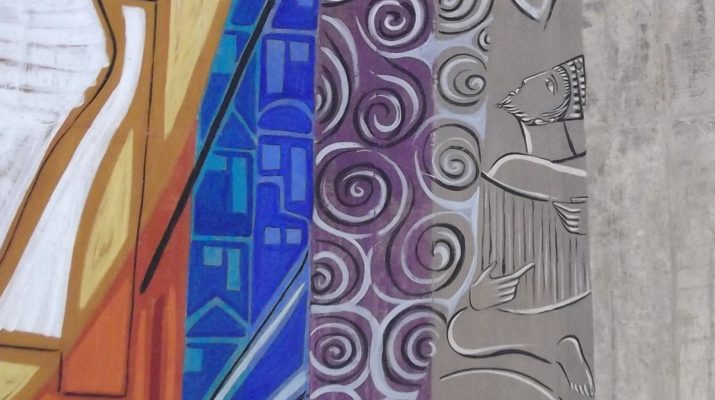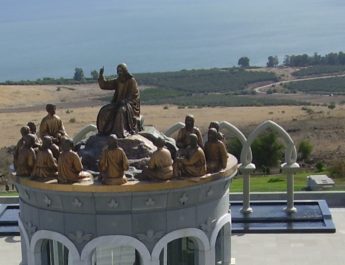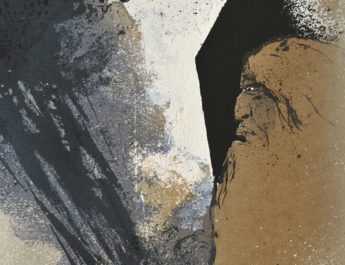Psalm 72
Of Solomon.I
1 GiveII the kingIII your justice,IV O God,V
and your righteousnessVI to a king’s son.VII
I “Solomon” = Shelomoh. From shalam (to be complete or sound; to have safety mentally, physically, or extending to one’s estate; so, if these things are safe and complete, the implication is that one would be friendly; and, if being friendly, one would make amends and that friendship would be reciprocated). This is Solomon or Shelomoh, meaning “peaceful.” It is the same root as the Hebrew word for peace – shalom.
II “give” = natan. This is to give, put, set, offer. It is to give literally or figuratively.
III “king” = melek. From malak (to be or become king or queen, to rise to the throne, to be crowned; by implication, to take counsel). This is king or royal.
IV “justice” = mishpat. From shaphat (to judge, defend, pronounce judgment, condemn, govern). This is a verdict or formal sentence whether from humans or from God. It includes the act of judging as well as the place that judging takes place, the suit itself, and the penalty. Abstractly, this is justice, which includes the rights of the participants.
V “God” = Elohim.
VI “righteousness” = tsedaqah. From the same as tsedeq (rightness, righteousness, vindication. It is everything that is just or ethical. That which is right in a natural, moral, or legal sense. It also includes just weights (i.e. true weights). Figuratively, this is justice, righteousness, equity – even prosperity). This is righteousness, justice, righteous acts, and moral virtue.
VII “son” = ben. From banah (to build or obtain children). This is son, age, child. It is son in a literal or figurative sense.
2 May he judgeVIII your peopleIX with righteousness,X
and your poorXI with justice.
VIII “judge” = din. This is to judge, defend, dispute, govern, quarrel, plead.
IX “people” = am. From amam (to darken, hide, associate; creating shadows by huddling together). This is people or nation. It can be used specifically for a tribe, collectively of troops or armies, or figuratively to refer to a flock of animals.
X “righteousness” = tsedeq. Related to “righteousness” in v1. See note VI above.
XI “poor” = ani. From anah (to be bowed down; humility or being browbeaten, oppressed, afflicted, or depressed; literal or figurative – depressed in mood or circumstance). This is humble, lowly, poor, or afflicted.
3 May the mountainsXII yieldXIII prosperityXIV for the people,
and the hills,XV in righteousness.XVI
XII “mountains” = har. From harar (hill or mountain). This is mountain, hill, hilly region.
XIII “yield” = nasa. This is to lift in a broad sense, literally and figuratively. So it could be to carry, take, or arise. It could also be bring forth, advance, accept.
XIV “prosperity” = shalom. Related to “Solomon” in superscript. From shalam (see note I above). This is completeness, soundness, welfare, favor, friend, good health. It is to be safe and figuratively well, happy, at peace, friendly. Abstractly, it includes the ideas of welfare and prosperity (not in excessive wealth, but in having enough).
XV “hills” = gibah. From the same as Geba (Geba or Gibeah; hillock); from the same as gabia (cup, bowl, flower; root might mean being convex). This is hill or little hill.
XVI “righteousness” = tsedaqah. Same as “righteousness” in v1. See note VI above.
4 May he defend the causeXVII of the poor of the people,
give deliveranceXVIII to theXIX needy,XX
and crushXXI the oppressor.XXII
XVII “defend the cause” = shaphat. Related to “justice” in v1. See note IV above.
XVIII “give deliverance” = yasha. To deliver, defend, help, preserve, rescue, be safe. Properly, to be open, wide or free, which implies being safe. Used causatively, it means to free.
XIX {untranslated} = ben. Same as “son” in v1. See note VII above. Here, it is plural.
XX “needy” = ebyon. From abah (to consent, obey, want, yield, accept). This is needy, poor, beggar. Someone who is wanting.
XXI “crush” = daka. 18x in OT. This is to crush or break into pieces. It can also mean bruise, being contrite or oppressed, to destroy, or be humble.
XXII “oppressor” = ashaq. This is to wrong, deceive, violate, or use oppression.
5 May he liveXXIII while the sunXXIV endures,XXV
and as long as the moon,XXVI throughout all generations.XXVII
XXIII “live” = yare. This is to fear, be afraid, dreadful. It can also refer to fearful reverence – to fear in a moral sense is to say to revere, respect.
XXIV “sun” = shemesh. This is sun or toward the east. Its root may mean being brilliant. Figuratively, this could be a ray or an arch.
XXV “endures” = paneh. From panah (to turn, face, appear). This is face in a literal or figurative sense. It could be face, presence, anger, respect. It can also be used of God to indicate divine favor or presence.
XXVI “moon” = yareach. Perhaps from the same as yerach (month). This is moon.
XXVII “all generations” = dor + dor. Literally, “generation of generations.” From dur (to move in a circle, which implies living somewhere or remaining there; it can also be the sense of piling or heaping up). This is a revolution of time, which is to say, an age or generation. It can also be a dwelling or one’s posterity.
6 May he be like rain that fallsXXVIII on the mown grass,XXIX
like showersXXX that waterXXXI the earth.XXXII
XXVIII “falls” = yarad. This is to go down, descend; going down in a literal or figurative sense. It can be going to the shore or a boundary, bringing down an enemy.
XXIX “mown grass” = gez. 4x in OT. From gazaz (to cut off, shave, shear sheep; figuratively, conquer an enemy). This is shearing, mowing, mown grace, or fleece.
XXX “showers” = rebibim. 6x in OT. From rabab (to be or become much or many, multiply). This is showers – rainfall as comprised of many drops.
XXXI “water” = zarziph. 1x in OT. Root may refer to flowing. This is a dripping, water. It could mean pouring rain.
XXXII “earth” = erets. Root may mean to be firm. This is earth, ground, field land, or country.
7 In his daysXXXIII may righteousnessXXXIV flourishXXXV
and peaceXXXVI abound,XXXVII until the moon is no more.XXXVIII
XXXIII “days” = yom. Root may mean being hot. This is the day in a literal or figurative sense. It can also mean birth, age, daylight, continually or other references to time.
XXXIV “righteousness” = tasddiq. Related to “righteousness” in v1 & “righteousness” in v2. From the same as tsedeq (see note VI above). This is just, innocent, righteous, righteous one, or lawful.
XXXV “flourish” = parach. This is to sprout, blossom, bloom, spread, flourish.
XXXVI “peace” = shalom. Same as “prosperity” in v3. See note XIV above.
XXXVII “abound” = rob. Related to “showers” in v6. From rabab (see note XXX above). This is any kind of abundance.
XXXVIII “no more” = beli. From balah (to grow old, wear out, waste away, consume, spend). This is properly a failure. So, it could mean without, not yet, unawares, lacking, something that wears out, or because not.
8 May he have dominionXXXIX from seaXL to sea,
and from the RiverXLI to the endsXLII of the earth.
XXXIX “have dominion” = radah. This is to step down, rule, dominate, have victory over, crumble.
XL “sea” = yam. Root may mean to roar. This is the sea, often referring to the Mediterranean. It comes from the root in the sense of the roar of crashing surf. This word is sometimes used for rivers or other sources of water. It can mean to the west or to the south.
XLI “River” = nahar. From nahar (to flow, sparkle, be cheerful). This is a stream, river, or flood. Particularly used for the Nile or Euphrates. Figuratively, this can mean prosperity.
XLII “ends” = ephes. From aphes (to finish, fail, stop, come to nothing, disappear). This is an end, ceasing, no further. It is often used to refer to the ends of the earth.
9 May his foesXLIII bow downXLIV beforeXLV him,
and his enemiesXLVI lickXLVII the dust.XLVIII
XLIII “foes” = tsiyyi. 6x in OT. From the same as tsi (a wild animal; maybe an animal living in the desert, a nomad). This is a wild animal living in the desert or a desert nomad.
XLIV “bow down” = kara. This is to bow, crouch, kneel down, subdue. It is to bend the knee in many senses. It can also mean to smite, a woman crouching in childbirth, or bowing to worship God.
XLV “before” = paneh. Same as “endures” in v5. See note XXV above.
XLVI “enemies” = oyeb. From ayab (to hate or be hostile to). This is a foe or enemy as one that you are hostile to.
XLVII “lick” = lachak. 6x in OT. This is to lick or lick up.
XLVIII “dust” = aphar. May be related to aphar (to throw dust, be dust). This is dust as powdered, perhaps gray colored. It could be ashes, powder, ground, dry earth, clay mud, or rubbish.
10 May the kings of TarshishXLIX and of the islesL
renderLI him tribute,LII
XLIX “Tarshish” = Tarshish. Perhaps from the same as tarshish (a gemstone like yellow jasper, beryl, or topaz) OR from Persian Tarshata (his excellency) OR from tarsata (feared, revered) OR from rashash (to break down, shatter; perhaps subjection) OR tor (dove) + shayish (alabaster, white, crystal). This is Tarshish – a port city on the Mediterranean – exact whereabouts unknown today. See https://www.abarim-publications.com/Meaning/Tarshish.html#.XoD6bKhKhPY
L “isles” = i. Perhaps from avah (to desire, crave, wish for, lust after). This is coastland, island, or region. It is a desirable place to live – dry land, coast.
LI “render” = shub. To turn back, return, turn away – literally or figuratively. Doesn’t necessarily imply going back to where you started from. This is also the root verb for the Hebrew word for repentance “teshubah.”
LII “tribute” = minchah. This is a gift or an offering, particularly a sacrificial one that is generally bloodless and given spontaneously (voluntarily).
may the kings of ShebaLIII and SebaLIV
bringLV gifts.LVI
LIII “Sheba” = Sheba. From Ethiopic (man) OR from Hebrew saba (to imbibe) OR from shaba (to capture (like a captive) OR from sheba (seven – the number of perfection/sacred fullness); {from shaba (to swear, curse, vow, make a covenant; properly, to be complete; this is to seven oneself – as in affirming something so strongly it is as though it were said seven times)}. This is Sheba or Sabean. It is somewhere in Africa or southwest Arabia as well as a personal name. It may mean “man,” “drunk,” “captive,” “splinter,” “seven,” or “oath.” See https://www.abarim-publications.com/Meaning/Sheba.html
LIV “Seba” = Seba. Perhaps related to “Sheba” in v10. 4x in OT. From saba (see note LIII above) OR of foreign origin. This is Seba, perhaps meaning “drunkard.” It is the person, their descendants, and their territory.
LV “bring” = qarab. This is to come near, offer, make ready, approach, take.
LVI “gifts” = eshkar. 2x in OT. Perhaps from sakar (wages, payment, service, salary, worth, reward, or benefit); from sakar (to hire, reward, earn). This is a gift or payment. It shares a root of “Issachar.”
11 May all kings fall downLVII before him,
all nationsLVIII give him service.LIX
LVII “fall down” = shachah. This is to bow down, make a humble entreaty, to do homage to royalty or to God.
LVIII “nations” = goy. From the same root as gevah (the back, person, or body); related to gev (among); related to gaah (to rise up). This is nation or people. Often used to refer to Gentiles or foreign nations. It can also be used figuratively for a group of animals. This is where the Yiddish “goy” comes from.
LIX “give…service” = abad. This is to work, serve, or compel. It can describe any kind of work or service (including religious devotion). Also, till or cultivate. Used causatively, it can mean to enslave or keep in bondage.
12 For he deliversLX the needy when they call,LXI
the poor and those who have no helper.LXII
LX “delivers” = natsal. This is to snatch someone or something away in a good sense – as rescue, defend, or deliver – or in a bad sense – as strip or plunder.
LXI “call” = shava. This is crying or shouting aloud, generally seeking freedom from some kind of trouble.
LXII “helper” = azar. This is to surround, which implies encircling to protect someone or help them out. It can also be help, ally, or support.
13 He has pityLXIII on the weakLXIV and the needy,
and savesLXV the livesLXVI of the needy.
LXIII “has pity” = chus. This is properly to cover. In a figurative sense it means looking with compassion, pitying, regarding, or sparing someone.
LXIV “weak” = dal. From dalal (to be low, hang, fade, be emptied, become poor, be oppressed). This is lean, weak, needy, poor. Properly, it is one who is dangling.
LXV “saves” = yasha. Same as “give deliverance” in v4. See note XVIII above.
LXVI “lives” = nephesh. Related to naphash (to refresh or be refreshed). This is soul, self, person, emotion. It is a breathing creature. Can also refer to appetites and desires.
14 From oppressionLXVII and violenceLXVIII he redeemsLXIX their life;
LXVII “oppression” = tok. 3x in OT. Perhaps from the same as tavek (among, middle, in the midst, center; perhaps properly to sever). This is injury, deceit, or oppression.
LXVIII “violence” = chamas. From chamas (to violate, do violence, to wrong; implies mistreatment). This is violence, cruelty, damage, wrong, injustice, or unrighteous. Violence implies a wrong done. The term is also used to describe unjust gain.
LXIX “redeems” = gaal. This is to redeem someone or something according to kinship laws. So, it could be acting on a relative’s behalf to buy back their property, to marry one’s brother’s widow, etc. This could be more briefly translated as to redeem, acts as kinsman, or purchase. As a noun, it could be deliverer or avenger.
and precious isLXX their bloodLXXI in his sight.LXXII
LXX “precious is” = yaqar. 11x in OT. This is to be precious, costly, rare, valued; properly, to be heavy; figuratively, valuable or inhibit.
LXXI “blood” = dam. Perhaps from damam (to cease, be or become mute, silent, still, cut off, hold peace, be astonished, die). This is blood, bloodshed, bloodguilt, lifeblood, and death. It is used for people and animals. More often blood from a wound or the blood of the innocent. Used figuratively for violence or for wine. Closely tied to life and death.
LXXII “sight” = ayin. This is eye in a literal or figurative sense so eye, appearance, favor, or a fountain (the eye of the landscape).
15 Long may he live!LXXIII
May goldLXXIV of Sheba be given to him.
May prayer be madeLXXV for him continually,LXXVI
and blessings invokedLXXVII for him all day long.
LXXIII “live” = chayah. This is to live or keep alive in a literal or figurative sense. So, it an be revive, nourish, or save.
LXXIV “gold” = zahab. Root may mean to shimmer. This is gold or something that has the color of gold like oil. It can also refer to a clear sky – to good weather.
LXXV “prayer be made” = palal. This is to judge for oneself or in an official capacity. It can also mean to pray or make supplication, to entreat.
LXXVI “continually” = tamid. May come from a word that means to stretch. This word means an indefinite period of time. So, it could be regular or daily. It could also be constantly, continually, always, or perpetually.
LXXVII “blessings invoked” = barak. This is to kneel, to bless. It is blessing God as part of worship and adoration or blessing humans to help them. It can be used as a euphemism to say curse God.
16 May there beLXXVIII abundanceLXXIX of grainLXXX in the land;LXXXI
LXXVIII “be” = hayah. This is to be or become, to happen.
LXXIX “abundance” = pissah. 1x in OT. From the same as pas (palm of the hand or underside of the foot; multi-colored; a tunic with long sleeves or a tunic that is many handbreadths wide); from pasas (to disappear, disperse). This is expansion or abundance. It could also be a handful. It is related to the word used for Joseph’s coat in Genesis.
LXXX “grain” = bar. 14x in OT. From barar (to select, polish, cleanse, brighten, purify). This is something that is winnowed so any kind of grain, whether in the field or harvested. It can be corn, wheat, or other grains. This can also refer to a field or the open country.
LXXXI “land” = erets. Same as “earth” in v6. See note XXXII above.
may it waveLXXXII on the topsLXXXIII of the mountains;
may its fruitLXXXIV be like Lebanon;LXXXV
LXXXII “wave” = raash. This is to quake, shake, tremble, shake from fear; leap like a locust.
LXXXIII “tops” = rosh. This may come a word that means to shake. It is the head, captain, or chief. It can also be excellent or the forefront. It can be first in position or in statue or in time (i.e. the beginning).
LXXXIV “fruit” = peri. From parah (to bear fruit, grow, be fruitful, increase; bearing fruit in a literal or figurative sense). This is fruit or reward.
LXXXV “Lebanon” = Lebanon. From laben (to be white, make white, make bricks) OR form Aramaic lebab (heart); corresponding to Hebrew lebab (heart, courage, one’s inner self, the mind, or the will). This is Lebanon. The sense of “white” comes from the snow on the top of its mountains. See https://en.wikipedia.org/wiki/Lebanon
and may people blossomLXXXVI in the citiesLXXXVII
like the grassLXXXVIII of the field.LXXXIX
LXXXVI “blossom” = tsuts. 9x in OT. This is to twinkle, shine, blossom. Figuratively, it is to flourish.
LXXXVII “cities” = iyr. From uwr (to awaken or wake oneself up). This can mean excitement in the sense of wakefulness or city. Properly, this is a place that is guarded. Guards kept schedules according to watches. This sense of the word would include cities as well as encampments or posts that were guarded.
LXXXVIII “grass” = eseb. Root may mean to be green or to glisten. This is grass or some other tender shoot.
LXXXIX “field” = erets. Same as “earth” in v6. See note XXXII above.
17 May his nameXC endureXCI forever,XCII
XC “name” = shem. May be from sum (to put, place, set). This is name, fame, renown. A name was thought to indicate something essential about a person – something about their individuality. So, this word can also mean honor, authority, or character.
XCI “endure” = hayah. Same as “be” in v16. See note LXXVIII above.
XCII “forever” = olam. This is a long scope of time whether in the past (antiquity, ancient time) or in the future (eternal, everlasting).
his fameXCIII continueXCIV as long asXCV the sun.
May all nations be blessedXCVI in him;
may they pronounce him happy.XCVII
XCIII “fame” = shem. Same as” name” in v17. See note XC above.
XCIV “continue” = nun. 1x in OT. This is to propagate a plant by planting its shoots. It is to increase or continue. Figuratively, it is to be perpetual.
XCV “as long as” = paneh. Same as “endures” in v5. See note XXV above.
XCVI “be blessed” = barak. Same as “blessings invoked” in v15. See note LXXVII above.
XCVII “pronounce…happy” = ashar. 16x in OT. To go straight, advance, proceed, direct, guide, be level, be honest, be blessed or happy.
18 Blessed be the Lord,XCVIII, XCIX the God of Israel,C
XCVIII “Lord” = YHVH. Related to “be” in v16. From havah (to be, become) or hayah (see note LXXVIII above). This is the name of the God of Israel, the self-existent and eternal one, the tetragrammaton. This pronunciation has been lost to time so “Lord” is generally used in its place.
XCIX {untranslated} = Elohim. Same as “God” in v1. See note V above.
C “Israel” = Yisrael. Related to “God” in v1. From sarah (to persist, exert oneself, contend, persevere, wrestle, prevail) + el (see note V above). This is Israel, meaning God strives or one who strives with God; new name for Jacob and for his offspring. This refers to the people and to the land.
who aloneCI doesCII wondrous things.CIII
CI “alone” = bad. From badad (to divide or be separated; alone, solitary, lonely, isolated, straggler). This is apart, alone, separation, body part, tree branch, except. It can also be a city’s chief.
CII “does” = asah. This is to make, do, act, appoint, become in many senses.
CIII “wondrous things” = pala. From pele (wonder, miracle, wonderful, marvelous thing). This is to be extraordinary, to arise, to be great or accomplish.
19 Blessed be his gloriousCIV name forever;
may his gloryCV fillCVI the whole earth.
AmenCVII and Amen.
CIV “glorious” = kabod. From kabad (to be heavy, weighty, burdensome). This is weighty. Figuratively, glorious, abundant, riches, honor, splendor – a reference to one’s reputation or character. This word is often used to describe God and God’s presence.
CV “glory” = kabod. Same as “glorious” in v19. See note CIV above.
CVI “fill” = male. This is fill, satisfy, replenish, accomplish, fulfill, confirm, or consecrate. It is fill in a literal or figurative sense.
CVII “amen” = amen. From Hebrew amen (verily, truly, amen, truth, so be it, faithfulness); from aman (to believe, endure, fulfill, confirm, support, be faithful, put one’s trust in, be steadfast. Figuratively, this is to be firm, steadfast, or faithful, trusting, believing, being permanent, morally solid). This word is literally firmness, but figuratively fidelity, faithfulness, honesty, responsibility, trust, truth, steadfastness. Properly, it is to be sure, certain, or firm. This is a word of emphasis indicating that something crucial follows.
20 The prayersCVIII of DavidCIX son of JesseCX are ended.CXI
CVIII “prayers” = tephillah. Related to “prayer be made” in v15. From palal (see note LXXV above). This is prayer or intercession. It can also be a hymn.
CIX “David” = David. From the same as dod (beloved, love, uncle); the root may mean to boil, which is used figuratively to describe love. So, this implies someone you love such as a friend, a lover, or a close family member like an uncle. David’s name likely means something like “beloved one.”
CX “Jesse” = Yishay. Perhaps from ish (man); {perhaps from enosh (human, humankind, mortal); from anash (to be weak, sick, or frail)} OR from the same as yesh (being, existence, substance). This is Jesse, a name which means “my husband” or “the Lord exists.” See https://www.abarim-publications.com/Meaning/Jesse.html
CXI “ended” = kalah. This is to end, be finished, complete, prepare, consume, spent, or completely destroyed.
Image credit: “Virgin’s Monastery (benedictine nuns), Petrópolis, Rio de Janeiro State, Brazil” by Cláudio Pastro, photo by Eugenio Hansen, OFS.




